A few years ago I walked into class of undergraduates in Boston a moment before it was to begin and picked up the book I was using for instruction that day. It was not the typical textbook—it was a book many of them had heard of all their lives but never read: a Bible.
The class was on interpretation. I turned to the beginning and read aloud: “In the beginning God created the heavens and earth. The earth was without form and void, and darkness was over the face of the deep.”
I went on to read through the entire first chapter of Genesis. When I finished, I set the Bible down and asked the class one question: “Is this true?”
The 32 students in that classroom could have given me 32 different answers. Initially all they gave me were blank stares. I repeated the question: “Think about what you just heard. Is it true or not?”
In a way, it was the wrong question to ask because the experience of hearing Genesis is nothing like, say, reading a textbook or a news article. You aren’t left wondering about the accuracy of the details. You are left wondering about…well, everything. You’re left in wonder. (Try reading it aloud now, and you’ll see.)
But in the ensuing minutes, the students began to answer the question by turning it around, flipping it over, and looking at it from different angles.
One young man explained that there is a scientific-historical answer to the question. “Some people would say yes, absolutely. The world was created just as that passage describes
Another student said there was a subjective religious answer: “If you buy into the religion behind the text, then it’s true for you.”
One young woman, who identified herself as a Reformed Jew, said, “I think it’s true, but I don’t think it describes precisely how the world came to be. Evolution does that better than this Bible story.”
“Well, then, what’s true about it?” the guy next to her asked.
“Lots of things. I mean, it’s a story, and there are themes in the story that are true, but it doesn’t describe a step-by-step order of events precisely as they happened.”
Someone else piped up. “I’ve never thought about this before, but maybe it’s truer than a step-by-step order of events. I mean, Genesis gets you thinking about God and the meaning behind creation. That’s better than science can do.”
In the next hour, the students discovered something they had been doing all their lives without knowing it: interpretation. When reading something, especially a famously contested book like the Bible, they brought a certain set of assumptions with them to the text. They were not blank slates, waiting to be filled by the experience of reading. They were people with complex presuppositions and, for better or worse, interpretive reflexes.
Some of the students, whether as Catholics, Protestants or Jews, had been reading Genesis and the Bible all their lives. But others had only crossed paths with the Bible in popular culture. Most had no experience of reacting to it for themselves, and then asking the question, “Is this true?”
When it comes to the Bible, “Is this true?” is one of the most pressing questions facing evangelical Christians because it gets us talking about how the Bible is true, which—even for people who build their lives upon reading Scripture—can lead to surprising revelations.
When we read the Bible, we’re not blank slates, waiting to be filled by God’s Word. We read with colored lenses— bi- and trifocals, even. We don’t have to toss aside all our presuppositions when reading Scripture, but we should strive to examine our interpretations. Why do you believe what you believe about particular passages of Scripture? About the story of Noah? About Job? David and Goliath? Jesus rising from the dead? Are those stories true? Are they true in the same way?
Read them again, discuss them with others, and discover anew how the Bible is true.
Patton Dodd is an editor for Beliefnet and the author of My Faith So Far: A Story of Conversion and Confusion (Jossey-Bass). His writing has appeared in a range of publications including the Financial Times, Newsweek, Christianity Today, and Books & Culture.




